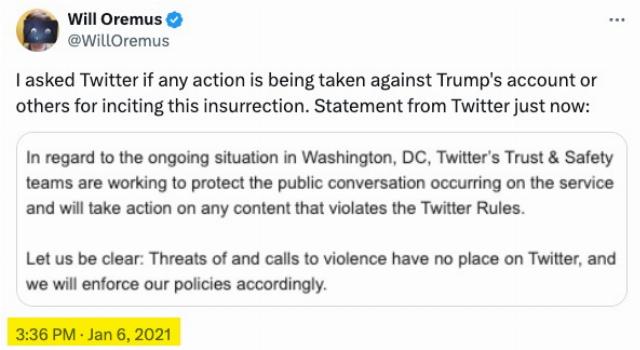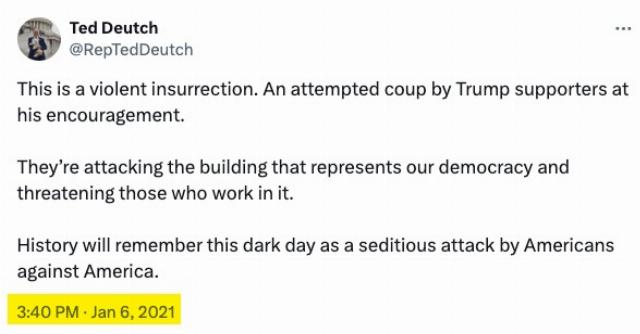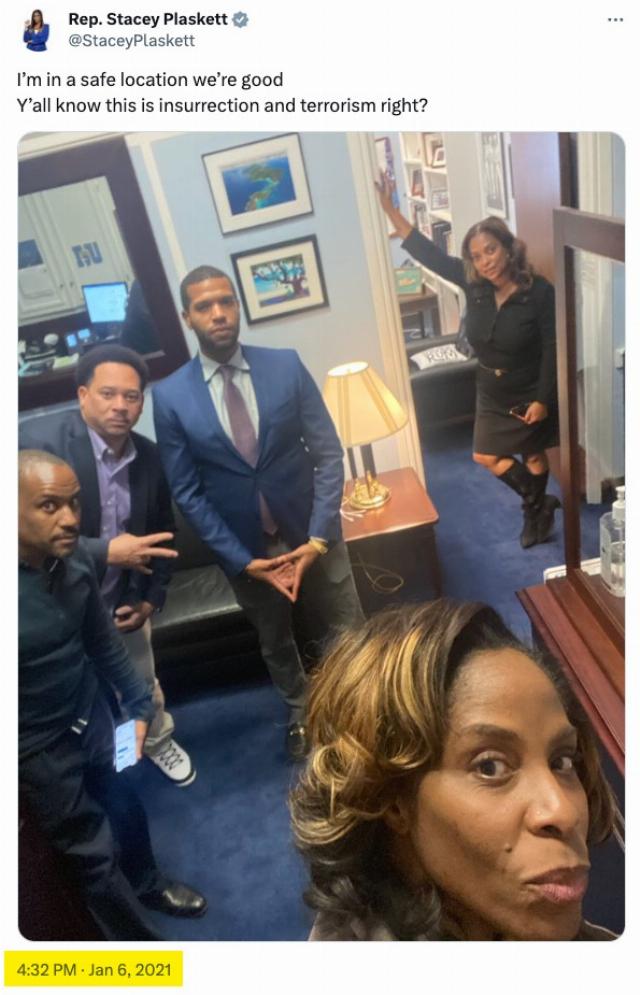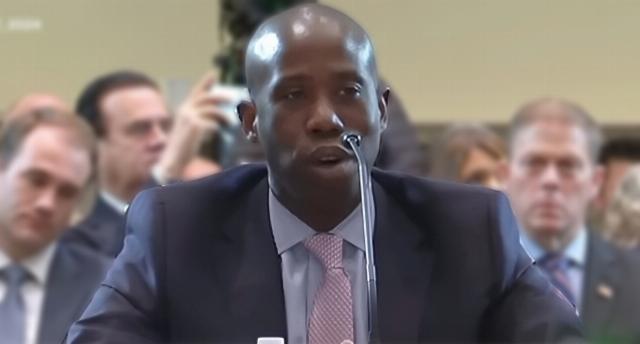Even the January 6 committee eventually conceded that President Trump had authorized the National Guard to be deployed on January 6. However, as events unfolded at the Capitol, the National Guard was nowhere to be seen. It showed up hours later, only after the situation was such that Trump and his supporters were tarred as “insurrectionists” and targeted for arrests. Now, a whistleblower has come forward to allege that one of Trump’s problems was that military leadership, starting with Mark Milley, made the deliberate decision to ignore Trump’s order. That’s court-martial stuff, along with the possibility of domestic terrorism and, ironically, insurrection.
Whenever thousands of people descend on a city, there should be a large police force in place. And when hundreds of thousands come to D.C. to complain about an election outcome, the National Guard should be there. And yet the troops weren’t. Here’s what we know.
Despite being warned about potential agitators and violence, Nancy Pelosi and D.C. Mayor Muriel Bowser refused to put the National Guard on standby. We also know that even the improperly convened, hyper-partisan, and corrupt January 6 committee acknowledged that Trump approved deploying the National Guard days before the event, greenlighting its immediate deployment in case things got out of hand.
And yet it wasn’t until well after 3 p.m. and into the 4:00 hour that the National Guard was mobilized. Troops finally showed up after 5:00. Significantly, by this time, the insurrection narrative (which could not have been organic so, therefore, must have been planned) was in place. These tweets are proof of the narrative instantly going into place:




It doesn’t take a genius to know that this was a set-up. And now, a whistleblower has come forward to say that the Pentagon was part of the set-up, going so far as to disobey Trump’s National Guard authorization for hours, enabling the narrative to be set.
According to Colonel Earl Matthews, the senior Pentagon leadership wasn’t just dragging its heels. Instead, it had put plans in place to refuse to comply with any order that President Trump, the constitutional Commander in Chief of the United States military, issued to deploy the National Guard:
But Matthews says that senior military leadership essentially stripped the president of his authority as commander-in-chief by preemptively planning to go against orders because they didn’t like the optics of uniformed soldiers at the Capitol.
‘I think a very plausible argument can be made that through no fault of his own, President Trump’s command authority over both the D.C. National Guard and the U.S. Army itself had been surreptitiously curtailed by the senior leadership of the Army on January 6, 2021,’ Matthews told DailyMail.com.
He continued: ‘Army leadership had unreasonably anticipated an ‘unlawful order’ from the President, an order that the President had no plans to issue, and were preemptively seeking to curtail his discretion to issue such an order.’
Matthews, who was the Staff Judge Advocate of the DCNG during the riot, was on the consequential and highly discussed phone call the afternoon of Jan. 6, 2021 with [former Army Secretary Ryan] McCarthy, D.C. Mayor Muriel Bowser and other senior leadership.
Matthews also said that while the Chief of Staff for Operations, Charles Flynn, had testified under oath that he was not on the call, he was, in fact, on the call, along with Army Staff Director Walter Piatt.
Both Flynn and Piatt, says Matthews, were seemingly disinterested in U.S. Capitol Police Chief Steven Sund’s pleas for reinforcements. Instead, they were worried about “the optics of the Guard coming to the Capitol.” Ironically, let me add, they were seemingly unconcerned when the Pentagon locked the Capitol area down completely upon Biden’s inauguration and long afterward. Once Trump was gone, showing Biden’s military might seemed to be the name of the game.
Matthews was not ambiguous in his take on what happened. He says that military officials deliberately and absolutely disobeyed Trump’s orders:
‘Former President Trump’s eagerness to engage the U.S. military to play a visible role in addressing domestic unrest during the late spring and summer of 2020 does appear to have prompted senior military leadership to take precautions, in preparing for the joint session against the possibility that the DC Guard might be ordered to deploy for an improper use,’ the [January 6 committee] final report reads.
But Matthews confirms the President’s authority was ignored or completely balked by Piatt and Flynn, as well as other military leaders.
And he says it is contradictory to try and blame Trump for the delay while also claiming he was attempting to use the DCNG to stop certification of the 2020 election results.
In sum, Matthews alleges that a cabal within the American military leadership planned to—and did—ignore an order from their constitutional Commander-in-Chief. They did so despite having reason to believe that doing so ran the risk of creating dangerous conditions in and around the United States Capitol, and, in fact, those dangerous conditions occurred. I’ve listed at the end of this post the sections of the Uniform Code of Military Justice that apply to their alleged conduct, including domestic terrorism and insurrection. These officers should all face a court-martial (and the retired ones can be returned to active duty) because if you want an insurrection and a coup, this was it.

Image: Colonel Earl Matthews (edited). YouTube screen grab.
Applicable provisions from
the U.S. Constitution and the United States Code
Constitution, Art. II, Section 2:
The President shall be Commander in Chief of the Army and Navy of the United States, and of the Militia of the several States, when called into the actual Service of the United States; he may require the Opinion, in writing, of the principal Officer in each of the executive Departments, upon any Subject relating to the Duties of their respective Offices...
10 U.S. Code § 881 - Art. 81. Conspiracy:
(a) Any person subject to this chapter who conspires with any other person to commit an offense under this chapter shall, if one or more of the conspirators does an act to effect the object of the conspiracy, be punished as a court-martial may direct.
(b) Any person subject to this chapter who conspires with any other person to commit an offense under the law of war, and who knowingly does an overt act to effect the object of the conspiracy, shall be punished, if death results to one or more of the victims, by death or such other punishment as a court-martial or military commission may direct, and, if death does not result to any of the victims, by such punishment, other than death, as a court-martial or military commission may direct.
10 U.S. Code § 890 - Art. 90. Willfully disobeying superior commissioned officer:
Any person subject to this chapter who willfully disobeys a lawful command of that person’s superior commissioned officer shall be punished—
(1) if the offense is committed in time of war, by death or such other punishment as a court-martial may direct; and
(2) if the offense is committed at any other time, by such punishment, other than death, as a court-martial may direct.
10 U.S. Code § 892 - Art. 92. Failure to obey order or regulation:
Any person subject to this chapter who—
(1) violates or fails to obey any lawful general order or regulation;
(2) having knowledge of any other lawful order issued by a member of the armed forces, which it is his duty to obey, fails to obey the order; or
(3) is derelict in the performance of his duties;
shall be punished as a court-martial may direct.
10 U.S. Code § 894 - Art. 94. Mutiny or sedition:
(a) Any person subject to this chapter who—
(1) with intent to usurp or override lawful military authority, refuses, in concert with any other person, to obey orders or otherwise do his duty or creates any violence or disturbance is guilty of mutiny;
(2) with intent to cause the overthrow or destruction of lawful civil authority, creates, in concert with any other person, revolt, violence, or other disturbance against that authority is guilty of sedition;
(3) fails to do his utmost to prevent and suppress a mutiny or sedition being committed in his presence, or fails to take all reasonable means to inform his superior commissioned officer or commanding officer of a mutiny or sedition which he knows or has reason to believe is taking place, is guilty of a failure to suppress or report a mutiny or sedition.
(b) A person who is found guilty of attempted mutiny, mutiny, sedition, or failure to suppress or report a mutiny or sedition shall be punished by death or such other punishment as a court-martial may direct.
10 U.S. Code § 916 - Art. 116. Riot or breach of peace:
Any person subject to this chapter who causes or participates in any riot or breach of the peace shall be punished as a court-martial may direct.
18 U.S. Code § 2381 - Treason:
Whoever, owing allegiance to the United States, levies war against them or adheres to their enemies, giving them aid and comfort within the United States or elsewhere, is guilty of treason and shall suffer death, or shall be imprisoned not less than five years and fined under this title but not less than $10,000; and shall be incapable of holding any office under the United States.
18 U.S. Code § 2383 - Rebellion or insurrection:
Whoever incites, sets on foot, assists, or engages in any rebellion or insurrection against the authority of the United States or the laws thereof, or gives aid or comfort thereto, shall be fined under this title or imprisoned not more than ten years, or both; and shall be incapable of holding any office under the United States.
18 U.S. Code § 2331 - Definitions (Terrorism):
As used in this chapter—
[snip]
(5) the term “domestic terrorism” means activities that—
(A) involve acts dangerous to human life that are a violation of the criminal laws of the United States or of any State;
(B) appear to be intended—
(i) to intimidate or coerce a civilian population;
(ii) to influence the policy of a government by intimidation or coercion; or
(iii) to affect the conduct of a government by mass destruction, assassination, or kidnapping; and
(C) occur primarily within the territorial jurisdiction of the United States...
No comments:
Post a Comment
Note: Only a member of this blog may post a comment.